The Inefficiencies of Informal Recycling in South Africa.
.jpeg)
Introduction Informal recycling, often seen as a necessity for survival among South Africa’s impoverished communities, carries significant inefficiencies and risks. While it serves as a source of income for many, it exposes workers to severe health hazards and perpetuates ineffective recycling methods. This article uncovers the harsh realities of informal recycling in South Africa, examining the dangerous conditions faced by recyclers, the inefficiencies in waste processing, particularly e-waste and plastics and the government’s controversial role in this industry. It aims to provide a comprehensive critique of the systemic issues that prioritize profit over pollution control and effective waste management. The Prevalence of Informal Recycling in South Africa The Scope of Informal Recycling Dependence on Informal Recycling Informal recycling is a lifeline for many South Africans, providing income for thousands of people who collect, sort and sell recyclable materials. According t...

.jpeg)

.png)

.png)